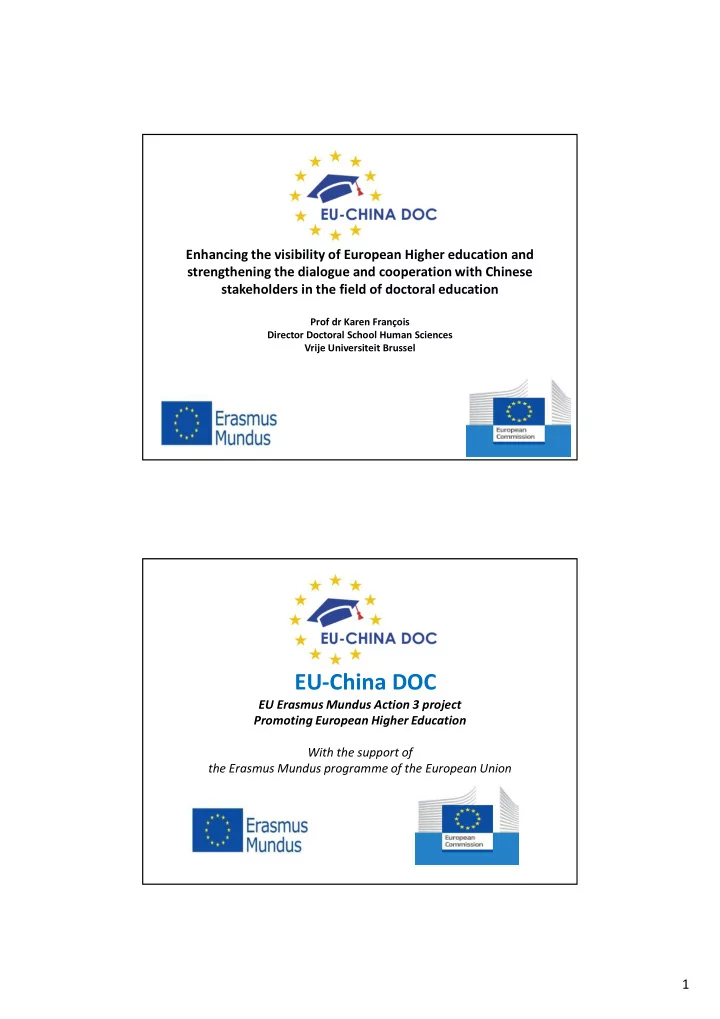

EU-China DOC Enhancing the visibility of European Higher education and strengthening the dialogue and cooperation with Chinese stakeholders in the field of doctoral education Prof dr Karen François Director Doctoral School Human Sciences Vrije Universiteit Brussel EU-China DOC EU Erasmus Mundus Action 3 project Promoting European Higher Education With the support of the Erasmus Mundus programme of the European Union 1
EU-China DOC Project partners The project will be implemented by a strong partnership with key players from Europe and China: • Vrije Universiteit Brussel (VUB), Belgium (PI) • Network of Universities from the Capitals of Europe (UNICA) • University of Vienna (UniVie), Austria • University of Tampere (UTA), Finland • University of Stockholm (SU), Sweden • Belgian-Chinese Chamber of Commerce (BCECC), Belgium EU-China DOC Project partners The project will be implemented by a strong partnership with key players from Europe and China: • China Education Association for International Exchange (CEAIE), China • Beijing Normal University (BNU), China • Peking University (PKU), China • Shanghai Jiao Tong University (SJTU), China • Southwest University (SWU), China 2
EU-China DOC Project duration: 3 years, Oct. 1, 2013–Sep.30, 2016 Grant amount: € 262.500,00 Framework and priority • Under the background of EU-China High Level People to People Dialogue • Creating better synergies in doctoral education between EU and China • Doctoral education is the drive of scientific innovation and construction of the knowledge society. EU-China DOC Project overall aims • Increase the awareness and knowledge about European Higher Education for Chinese higher education actors • Strengthen dialogue and cooperation between European and Chinese stakeholders in the field of doctoral education, training and research 3
EU-China DOC Main target groups • European and Chinese higher education institutions (including policy makers, academic leadership, administrators, professors/supervisors, students/doctoral candidates) • European and Chinese associations of higher education institutions, employers, research institutes and councils. EU-China DOC Main activities and outputs • Promotional events • Dialogue and interactive workshops • Survey and impact assessment • Reports (outcomes of events, survey, good practices, evaluation results, quality assessment) • Brochure, website, news releases • Publication and documents available in two languages (English & Chinese) 4
Project events • EU-China DOC Conference on EU-China Dialogue in Doctoral Education , Beijing, 25-26 November 2013 Organisation: � Peking University (hosting) � Vrije Universiteit Brussels � China Education Association for International Exchange � Beijing Normal University Project events • EU-China DOC workshop Brussels, May 2014 � Theme: European doctoral education and training, governance, structure, funding schemes, entrepreneurship and societal significance • EU-China DOC workshop Shanghai, Dec. 2014 � Theme: Doctoral education: measures for quality assurance 5
Project events • EU-China DOC workshop Vienna, May 2015 � Theme: Doctoral training and high quality of doctoral supervision, criteria of good promotership • EU-China DOC workshop Stockholm, May 2016 � Theme: Doctoral education, Multi-disciplinary and cross-border cooperation, risk-taking attitudes and employability Project events • EU-China DOC Project Closing Conference, Chongqing, September 2016 Southwest University 6
First outcomes of the Project Launch event Beijing, 25-26 November 2013 The Salzburg Principles as the basis of the Reforms for European Doctoral Education • Basic principles (Salzburg principles) (I: 2005 and II: 2009) • Recommendation (no obligations) as quality assurance First outcomes of the Project Launch event Beijing, 25-26 November 2013 Main Salzburg principles • The doctorate is Research based • Doctoral education supports Individual development of PhD candidate. There is no fixed program. The PhD candidate takes an individual path in order to meet the needs of the candidate. • Supervision is central to doctoral education. It is moving from single one to one relation to an institutional responsibility creating a culture of supervision 7
First observations on Similarities and differences • EU : increasing number of doctoral schools (65% TRENDS 2010) • China : doctoral education is part of graduate schools (Ma – PhD) • EU : academic doctorates • China : professional doctorates and academic doctorates • EU : emphasis on individual development of the PhD candidate • China : emphasis on regular courses and entry examination Beijing recommendations 2013 1. Offer courses for doctoral candidates to enhance research skill (methodology) and language skills 2. Provide transferable skills trainings for candidates (non-academic career) 3. Establish a code of conduct for supervision to clarify roles and responsibilities and provide trainings to professionalize supervision 4. Encourage team supervision and in particular the involvement of supervisors from abroad 5. Provide a working environment to assure a good research-work balance given the different tasks of doctoral candidates 8
Beijing recommendations 2013 6. Establish Doctoral Schools and assure dedicated professional administration according the specific need of doctoral candidates (PhD office) 7. Assure appropriate Representation of Doctoral Candidates in the decision making bodies to give them a voice 8. Strive for international attractive curricula (E program) 9. Foster international mobility such as stays abroad, conferences and international fora 10. Make things work! Starting from good practices – looking for bottle necks Project Website http://www.euchinadoc.com/ Project Coordinator: Prof Chang Zhu: Vrije Universiteit Brussel 9
EU-China DOC Secretariat Email: ECHE@vub.ac.be Vrije Universiteit Brussel (VUB) 10
Recommend
More recommend